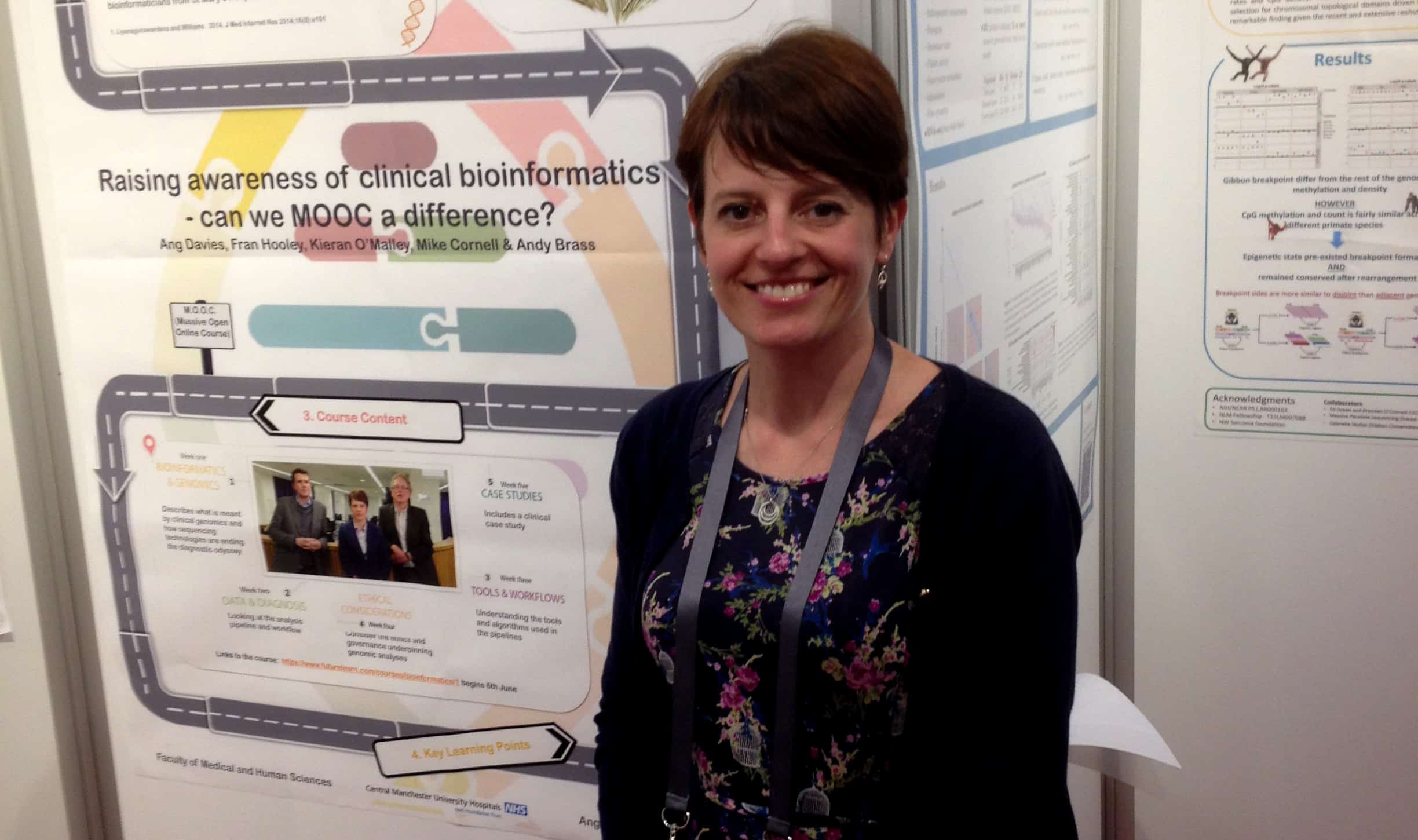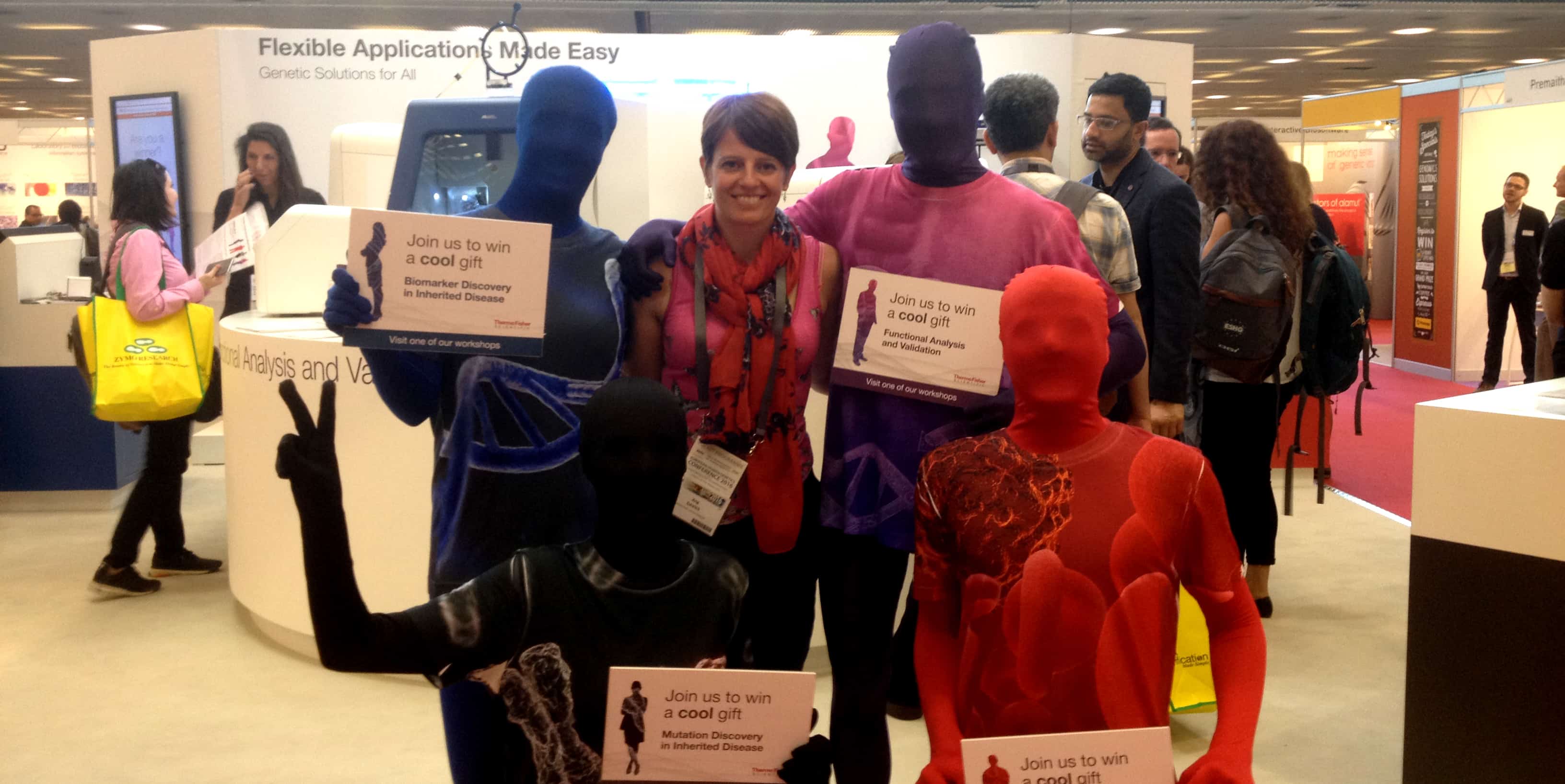Attending the European Society of Human Genetics 2016 conference
In this post Dr Ang Davies, educator on the course Clinical Bioinformatics: Unlocking Genomics in Healthcare, and Dr Mike Cornell, a lecturer in clinical bioinformatics at the University of Manchester, tell us about their trip to Barcelona for the ESHG 2016 conference.
In this post Dr Ang Davies, educator on the course Clinical Bioinformatics: Unlocking Genomics in Healthcare, and Dr Mike Cornell, a lecturer in clinical bioinformatics at the University of Manchester, tell us about their trip to Barcelona for for the ESHG 2016 conference.

As conference locations go – Barcelona was a pretty good destination to host the 49th annual European Society of Human Genetics meeting, shared with the European Meeting on Psychosocial Aspects of Genetics (EMPAG). As always it was a packed programme but here are a few of the highlights that may be of interest to learners getting ready for Clinical Bioinformatics Unlocking the Genomics in Healthcare, or those with an interest in bioinformatics.
Evan Eichler from University of Washington opened the conference, describing the use of PacBio long read sequencing to identify structural variants. Eighty percent of structural variants can’t be identified by short read sequencing technologies. Evan suggested moving from alignment to a reference genome to de novo sequencing of genomes (the 2015 Nature paper describing this work can be found here). Nick Loman from the University of Birmingham continued the 3rd generation sequencing theme by giving an eye into the world of virological outbreak surveillance, describing his group’s ground-breaking work in real-time monitoring of the Ebola outbreak, using the Nanopore MinION and their lab-in-a-suitcase approach. His team undertook next generation sequencing in some of the remotest parts of Africa, and trained scientists out there to use this technology. Nick’s group work continues in South America studying Zika virus with their lab-in-a-caravan (to read more visit Loman lab).
As we will discuss on the course – data sharing is critical within the clinical genetics community to ensure the best patient outcomes, though it’s really important that this is done in a practical, legal and ethical way, consistent with the patient’s consent. Sobia Raza from the PHG described her work in exploring this topic and the recommendations from this which can be found at PHG Foundation data sharing report.
From EMPAG (European Meeting on Psychosocial Aspects of Genetics) there were some great insights relating to the engagement of diverse communities in genetic services, including a project presented by Gamet et al from New Zealand, they have worked extensively with large Maori families to develop improved uptake of genetic testing. We also watched a wonderful animation presented by the Melbourne Genomics Health Alliance illustrating their joint work with the National centre for Indigenous Genomics, ensuring the appropriate and respectful use of resources for genomic research (you can have a look at this here: NCIG: genomic research animation for donor communities).
On the course we will also be discussing variants of uncertain significance and incidental findings, these increase in number with the application of gene panels and whole exome sequencing. Interpreting these within the clinic is not always straightforward, and this topic came of during the meeting when Anneke Lucassen from the University of Southampton argued in her talk that we should be more open and honest about this to engender trust in genomic testing and consider obtaining broader consent to cover these potential uncertainties. An interesting article describing this kind of scenario was reported by the New York Times earlier this year.
Later in the course we will look at a case study on retinal dystrophy – the most common cause of blindness in working age people. This was also touched on in Barcelona: Gavin Arno from UCL/Moorfields eye hospital, UK described the work of the UK Inherited Retinal Disease Consortium (UKIRDC) to find new genes associated with the disease. They studied over 1000 inherited retinal disease families using whole exome or genome sequencing, and linking genotypic information with detailed phenotypes they were able to discover 3 genes previously unreported in human retinal disease.
Along with exciting discoveries, we also learnt more about specific types of kit. On Monday the Ensembl team delivered a whistle stop tour of some of their tools, including interactive sessions on the Ensembl gene browser, one of the main genome browsers used to view human genomes: Biomart. This browser can be used to download information from Ensembl, relating to genes and transcripts. It also features Variant effect Predictor which includes tools such as SIFT and Polyphen used to predict the effect of missense variants. They have some excellent tutorials on their webpages Ensembl tutorials.

Monday finished with two talks on the clinical interpretation of genetic variants. Stuart Cook discussed methods for assessing pathogenicity of variants associated with cardiac diseases, making the case for limited panels over whole exome sequencing and discussed the problem of inclusion of weakly associated genes on cardiomyopathy panels. His group’s work describing their sequencing assay can be found here, and there are a set of publicly available tools for analysing cardiac disease variants over at CardioDB.
A final highlight was Heidi Rehm from Partners Healthcare discussing the development of the ACMG guidelines for interpreting variants. The performance of diagnostic labs using these guidelines to classify variants has been evaluated in an ACMG “bake off” organised by Clinical Sequencing Exploratory Research. The results highlighted the discordance between different diagnostic labs, some of which would affect the medical management of patients. Once again, these results emphasise the need to share variant data and Heidi discussed development of two resources, the Clinical Genome Resource (ClinGen) and ClinVar that will assist in the collection and interpretation of variants.
If you want more of a flavour of topics and debate around the conference you can follow #eshg2016 on twitter. For now, we’ll be looking forward to an equally stimulating programme in Copenhagen in 2017!
Learn more about bioinformatics, join Clinical Bioinformatics Unlocking the Genomics in Healthcare now.




